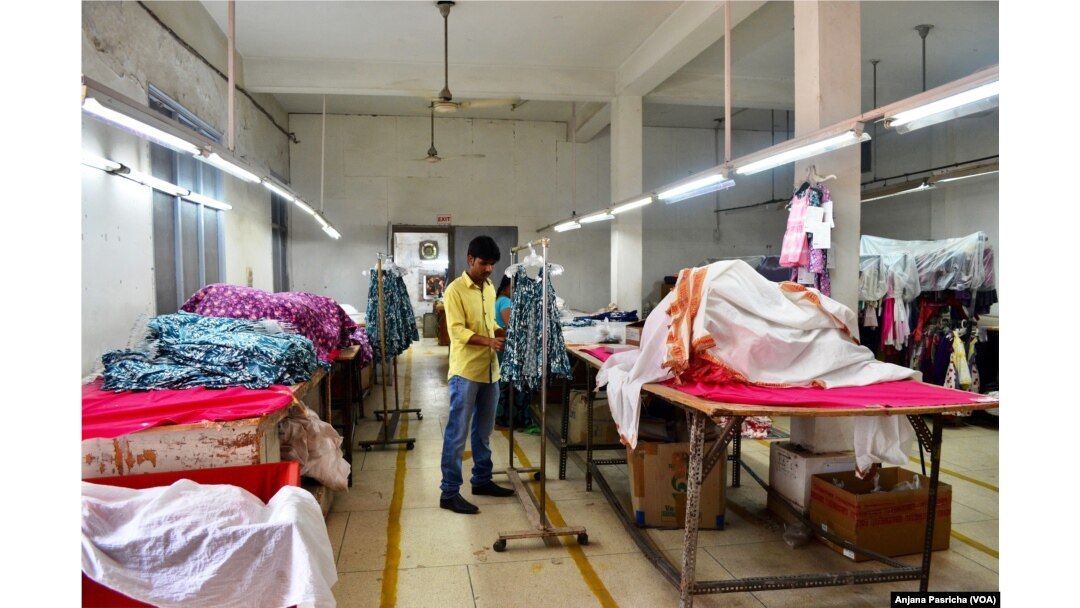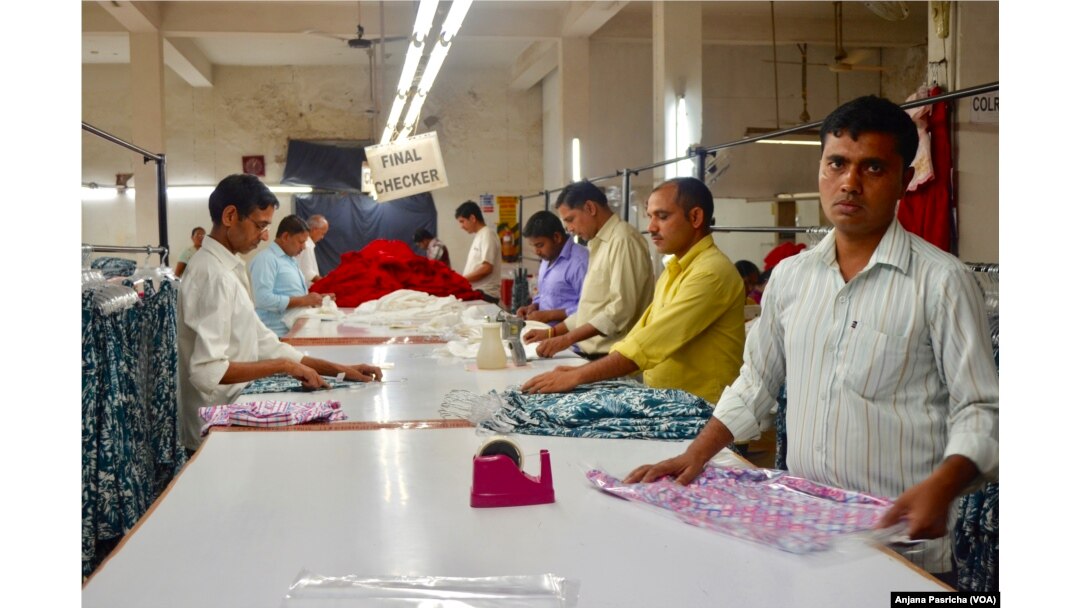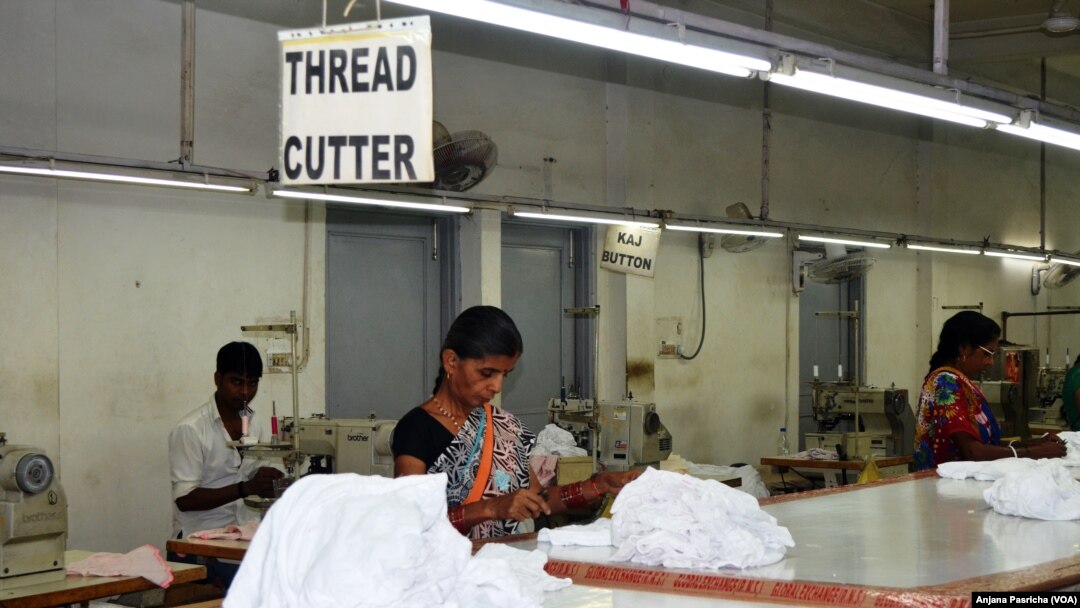When President Donald Trump abandoned the Trans Pacific Partnership (TPP) Deal, there was a sense of relief in India, where sectors such as apparel and pharmaceuticals were bracing for a hit.
The ambitious pact between 12 countries bordering the Asia Pacific to boost trade had been a “serious worry” for Sudhir Dhingra, Managing Director of New Delhi-based Orient Craft, one of India’s biggest apparel exporters.

India's apparel industry had feared losing business due to the Trans Pacific Partnership agreement that involved 12 countries. (A. Pasricha/VOA)
India is happy to see TPP go away
The reason: it would have made India’s exports less competitive as it slashed tariffs and gave countries like Vietnam and Malaysia preferential access to markets in the United States and Japan.
Dhingra calls its scrapping very good news.
“I personally was very concerned for the trade,” he explains. “As it is, parts of those region are more productive, more efficient. And on top of that if you get duty free advantages, so obviously the entire business runs to these markets.”
Huge apparels industry in India
India’s garment and textiles sector employs millions of people and about 20 percent of apparel exports are headed to the United States.

India's garment industry employs millions of people. (A. Pasricha/VOA)
The apparel industry was not the only one threatened by TPP. India’s Commerce Minister, Nirmala Sitharaman had said that the pact would impact a range of sectors like leather goods, plastics, chemicals and textiles.
Effectively, the TPP meant that India would have been sidelined from a mega trade agreement which covered about 40 percent of global trade.
Estimates for export losses that India would have eventually suffered have varied widely. The Peterson Institute for International Economics said India’s losses would approach $50 billion per annum if China and other countries joined the pact at a later stage. Others said it would be far less.
But with losses being a near certainty, the scrapping of the TPP gives India respite, said Biswajit Dhar, trade expert and professor at New Delhi’s Jawaharlal Nehru University.
“There might be a sense of relief because TPP was threatening to introduce standards for trade liberalization and introduction of new rules which were far more stringent than those that India is comfortable with,” he said.
The TPP involved setting strict labor and environment regulations and higher intellectual property rights protection.
Regional deals
The end of TPP is now likely to turn the focus to regional agreements – one of them could be the Regional Comprehensive Economic Partnership (RCEP) – a bloc which includes India and China and accounts for nearly half the world’s population.
Many expect that China will step in to fill the gap left by the United States as new trade deals are hammered out. Some say that will be a relief for India as China is unlikely to set the same kind of standards as the one that were envisaged for the TPP.
However, many others feel that may not be any more comforting for India because it would also mean that India would have to open its markets to China.
China's influence
“Even without preferential access, China has managed to put its footprint in the Indian economy quite substantially,” pointed out trade expert Dhar. “So the worry among Indian business people is that if China is given preferential market access, then there would be a real problem that they will have on their hands.”
India, long known for its tough business climate, complicated rules that deter investment, high taxes and stringent labor laws, has not benefited from the manufacturing boom that transformed many Asian economies in recent decades.
Efforts to give a lift to manufacturing under a flagship program of Prime Minister Narendra Modi called “Make in India” has yet to have a significant impact.
Uncertain economic future
Trade experts warn with the scrapping of the TPP and more talk of protectionism by the United States, the future of global trade has become uncertain. “I don’t think we should cheer”, said Arpita Mukherjee, a Professor at the Indian Council for Research on International Economic Relations. “He (Trump) is also saying Make in America. It is an unknown scenario, so you should be worried.”
Experts are calling on India to implement reforms to make its industries globally competitive. “You have to offer ease of doing business, and once you do that, you will benefit by any trade agreement,” she said.
Still with the looming threat of TPP off his mind, apparel exporter Dhingra remains optimistic. He and others feel it will give India breathing room as the government presses ahead with promised reforms which Modi has promised.
About 20 percent of India's apparel exports are headed to the United States. (A. Pasricha/VOA)
Dhingra said different states in the country have been wooing businesses like his in the past year offering subsidies and other incentives that could help him become more competitive.
“There is not a week that I don’t get a call from some state government or the other where they want Orient Craft to set up factories there. They are willing to give support, they are willing to give subsidies. This is something I have not seen in the past 40 years,” he said.


